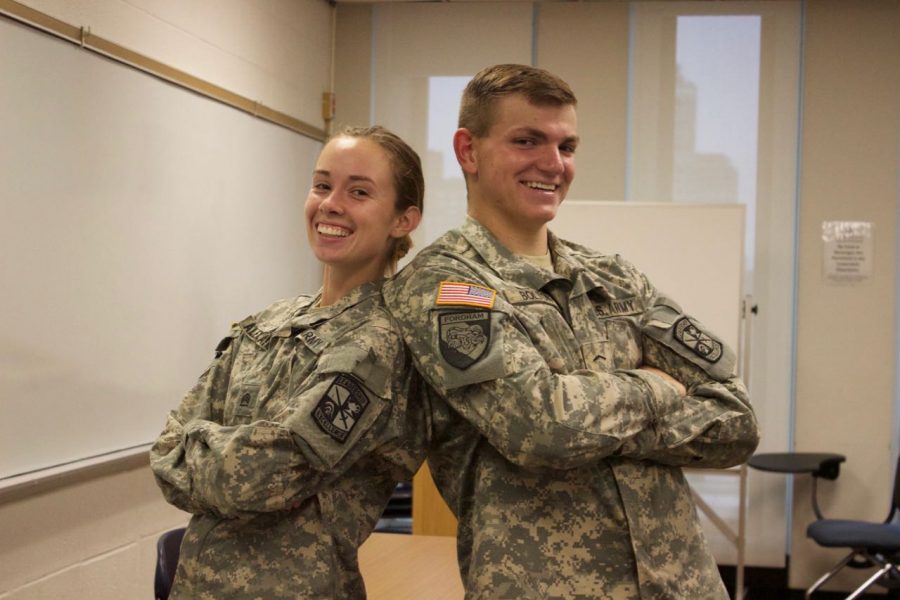ROTC Program Trains Students for Future
ROTC students face a tough schedule on the daily, balancing a college life and military career simultaneously.
October 12, 2016
At 6 a.m. on a Friday morning, it’s hard to imagine the average NYU student would be anywhere but in bed. But each week, there is a small cohort of students up bright and early, ready to make the trek to Fordham University Lincoln Center for intensive physical military training training.
They are a part of the part of the Army Reserve Officers’ Training Corps, a four year program that allows college students to train for the military while still attending school. The program includes military science classes, physical training and summer training on top of students’ individual responsibilities in school.
When a student graduates, they are commissioned as a second lieutenant in the military. CAS junior Riley Goodell, who is part of the Army ROTC program, attested to how quickly things can move.
“It’s really fast paced when you think about it, because 22 can seem pretty young to be officers, but they prepare us,” Goodell said.
The terms of service required after graduation depend on the branch of the military, as well as what the contract specifies. Cadets who sign a contract generally serve for eight years once commissioned. Goodell explained that there are different ways to serve, whether on active duty, in the reserve or even in the national guard. But for Goodell, the commitment isn’t scary.
“If you really want to be in the army and you really see a future for yourself, the year requirement doesn’t really matter,” Goodell said. “It’s not really that daunting, because you get so much from it.”
Balancing school with ROTC is no easy feat, but it’s still possible. The Army program at Fordham University Lincoln Center meets every Monday, Wednesday, and Friday for physical training at 6:30 a.m. and ends at 8 a.m. On Fridays, classes follow physical training from 9 a.m. to 3 p.m. Cadets change into their ACUs, or military camo, for their Friday classes, which consist of NCO time and labs, or general classes for all the years. After, they split off into their year groups for more tailored lessons.
CAS junior Marisa Alexander agreed that the experience is rewarding, even if incredibly time-consuming. Alexander balances the program with being a full-time student and a part of a sorority.
“I don’t have a lot of free time, but it’s worth it,” Alexander said.
The same time commitment is required within the Air Force ROTC program. Steinhardt sophomore Esther Roh goes to her program every Friday, but her routine changes every week. They start at 8:30 a.m. and train for about an hour before Aerospace Studies classes start. Roh’s Friday ends at 10 p.m.
“I try to plan my day by the hour. If I’m giving myself a break from studying for NYU, I’m studying for ROTC,” Roh explains.
At NYU, no ROTC program is offered, so students who wish to participate must go through Fordham University’s Army ROTC or Manhattan College’s Air Force ROTC instead. While many people who enter ROTC are freshmen, both programs allow college students to be folded in later in their college careers as well. Both Goodell and Alexander entered the Army ROTC program as sophomores, and both have contracts now. Roh did not enroll in the Air Force ROTC program until this fall, and is taking first year classes to make up for lost time.
Many who participate, like Alexander and Roh, have ties to the military through family or friends.
“I’ve always wanted to join the military and this was a really cool way to go to college at the same time and be a leader,” Alexander said. She went on to explain that although she had a strong Navy influence from home, she chose Army because there were no Navy programs nearby and she wanted to pursue her studies outside of the STEM fields, something more feasible in the Army program.
Roh is also heavily influenced through her family experiences.
“I’ve wanted to do ROTC since I was a sophomore in high school,” Roh said. “I have a lot of heavy military influence in my family and seeing how the Marine Corps changed my brother into an honorable person made me want that honor.”
Not all students need to have ties to the military to get involved in ROTC. Goodell had no military background whatsoever when she started, and wanted to get involved for a more personal reason.
“I wanted to be challenged academically, and that’s why I came to NYU, but I also had this other need for fulfillment and wanting to do something that would contribute to society in some way. I thought that the Army would be a very out of the box approach to that,” Goodell said.
Still, all three find the program to be something special.
“I love the people,” Alexander said. “I love what we learn, I love learning about leadership. I love the opportunities it’s given me.”
Email Kaitlyn Wang at [email protected].
























































































































































